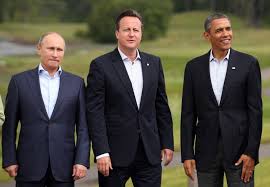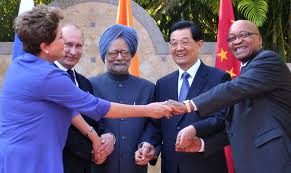I was caught by the discussion in this morning’s New York Times in the “Room for Debate” section. At the NYT site several old friends from global summitry analysis and a few new acquaintances set out their opinions on whether to kick Russia out of the G8 or not.
A couple of things need repeating. The G8 appeared rather late in the rise of the G7 Informal. The G7 leaders summit first met in 1975 – as the 6 – and Canada was added the next year – hence the G7. The G7 leaders continued on annually until Russia was added formally in 1989 at the Birmingham Summit. As commentators correctly pointed out in the NYT, the underlying motivation of the G7 then, and the G8 now was and is to promote open democracy, individual liberty and social advance. Notwithstanding the group was generally viewed as the ‘Club of the Rich’, G7 leaders in the 90s thought that the inclusion of Russia, especially Bill Clinton, Tony Blair and their officials, could help cement Russia on a path to democracy, respect for human rights and support for free markets at home and abroad.
As is evident today that hoped for Russian trajectory was never adopted by Vladimir Putin, whether he was president or prime minister. Russia is by no one’s estimate a defender of democracy or free markets. And today, moreover we face an aggressive Russia – let’s not forget Georgia – that is prepared to intrude militarily into the domestic affairs of a neighboring country Ukraine on the flimsy excuse that Russia is protecting ethnic Russians, or even Russian speaking Ukrainians, in the Ukraine or at least in the Crimea. Where have we heard that kind of rhetoric before? From the simple proposition that in the current turbulence of Ukrainian political change and civil protest there are means other than military intervention, or at least other than, unilateral military intervention by Russia, (or the European Union, the United States and the rest of the international community) the action looks like what it is – a naked grab and a serious violation of international law.
So in the face of a non-democratic Russia and an illegal intervention by Russia in the Crimea what should be done? First correcting an error – admitting an undemocratic Russia in the G7 – doesn’t seem timely. Certainly not at this moment. Kicking countries out hardly is in the spirit of collective action that underscores all of the Informals – whether G7, G8 G20, BRICS, etc. It may well make sense, however, to suspend the meeting of the G8 leaders altogether and for the foreseeable future. The G7 has continued to exist – at least at the Finance Ministers and Central Bankers level – since the creation of the G8. So it should continue. And if the G7 should meet as a leaders summit, so be it. I have no doubt the next host – Germany I believe- could be drafted in to hold a G7 leaders summit instead of the G8.
More intriguing however is how should the BRICS react to Russia’s aggressive behavior? Surely intervention of the sort underway by Russia can’t possibly match the ideals of countries like Brazil, or India or South Africa, or even a China. These are countries that defend national sovereignty at all costs and insist, insistently, on non interference in the domestic affairs of other countries.
The focus by all these opinion folks in the NYT is slightly misplaced. It’s not the G7 but the BRICS or even the G20 that needs to consider the inclusion of Russia. In particular with Brazil hosting the next BRICS summit, we need to hear from President Dilma Rousseff of Brazil whether Russia’s participation should be suspended.
Where is the strong voice of Brazil?
Image Credits google.com for the G8 and www.theatlanticpost.com for theBRICS
Some



